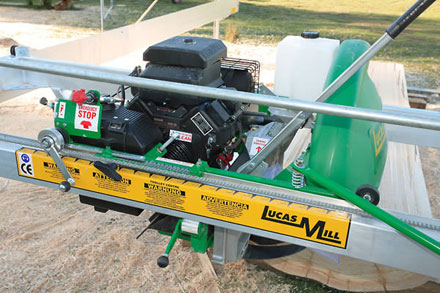
In March 2014, a family-run engineering business in north-eastern Victoria found its successful portable sawmill — exported to more than 100 countries worldwide — was featured on a Chinese website. But it was not their machine, but a near exact imitation. Source: ABC News
“We’ve always been concerned that there’d be a copier in somewhere like China,” Lucas Mills co-owner Warren Lucas explained.
“Matt, who is my right-hand man, spends a lot of time on the internet just keeping an eye on what our competitors are up to.
“And he found a company that was even advertising it basically as a Lucas Mill.”
The company sought urgent advice from a Melbourne patent attorney firm.
“There has been a long-standing problem of Chinese companies infringing patent rights of foreigners,” Tracey Hendy of FPA Patent Attorneys said.
But getting evidence that would be strong enough to challenge the counterfeiters in a Chinese court of law was a daunting and difficult task.
So the Australian legal team joined forces with Chinese patent lawyers and, crucially, a private investigator. His role was pivotal.
He learnt that a counterfeit machine had left the factory in China and was in a large dockside warehouse ready for export. In a nail-biting sting, the Chinese customs authorities swooped.
When the shipping container was opened it revealed a portable sawmill that was almost an exact copy of the Lucas machine. Right down to the green and yellow livery.
“The machine itself, even the gearbox was a direct copy,” Jenny Lucas, who runs the business with husband Warren, recalled. “Every single finger print on our machine has been copied.”
Husband Warren continued the story. “When the crate was opened up, a Chinese judge was present and he made the observation when he saw the instruction manual — he said to our patent attorney in China, ‘I think we’ve got them here’.
“’How can it not be the same when they can use your instruction manual, picture for picture and word for word in Chinese?'”
It was the irrefutable proof the family needed.
Late last year Lucas Mills was awarded damages of 2 million yuan — about $430,000. However, the defendants appealed against that damages figure, and a few weeks ago a Chinese court reduced the amount of statutory compensation by half.
The long and costly case cost far more than that, but there was more at stake than just money.
“We needed to protect our market … our product, all the research and development we’d put years into developing,” Ms Lucas said. “And it’s criminal for someone to come along and just copy that.
“So basically for us, we didn’t have any other option.”
Ms Hendy said there were other considerations that made the court case necessary.
“The Chinese knock-off was inferior from a safety perspective so potentially it could have damaged Lucas’ safety reputation,” she said.
Lucas Mills believes the chances of getting their compensation payout are slim but the legal victory in China was crucial.
“It has stopped them from copying us and China has unique exclusivity laws so they cannot manufacture in China for another 30 years,” Mr Lucas said.
In China, a case like this is not all that unusual, but in Australia the Lucas’ legal victory was big news.
“I think it has created a deal of excitement in Australia because here you have an Australian company that has succeeded in China against a Chinese company for patent infringement,” Ms Hendy said. “So we’re really proud I guess that a little company in Australia can stand up and protect its own product.
“So it’s a pretty good story I think.”





